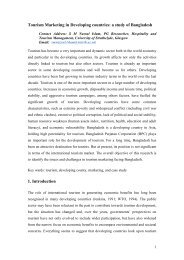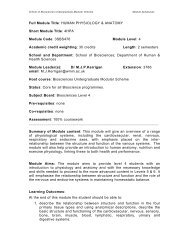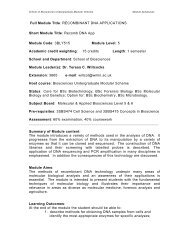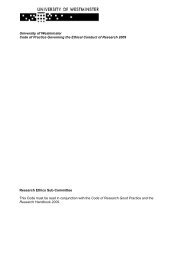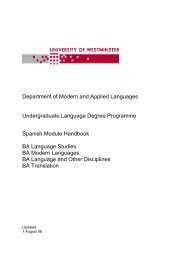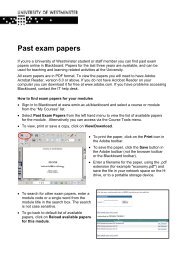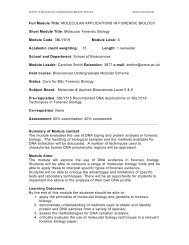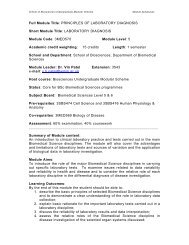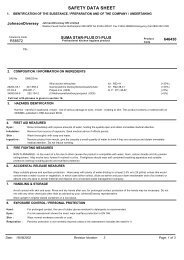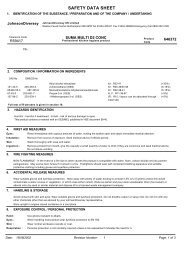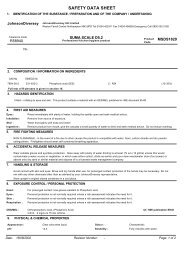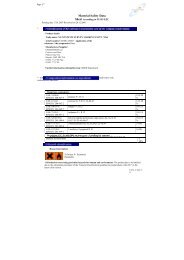CONTENTS 1. Introduction 1.1 Course Outline 1 1.2 Introduction ...
CONTENTS 1. Introduction 1.1 Course Outline 1 1.2 Introduction ...
CONTENTS 1. Introduction 1.1 Course Outline 1 1.2 Introduction ...
You also want an ePaper? Increase the reach of your titles
YUMPU automatically turns print PDFs into web optimized ePapers that Google loves.
Referrals<br />
Referral opportunities, sometimes called “resits”, are provided for students at the next time the<br />
module is delivered. There is no special late summer re-assessment for undergraduates who have<br />
failed modules in Semester 1 or 2.<br />
Defer<br />
This term is used on student transcripts and profiles to indicate that a student has been granted<br />
permission for a late assessment (or in some cases a further assessment) by a given date (this will<br />
usually be as a result of a successful outcome of a student's Extenuating Circumstances submission.<br />
In the case of a deferred assessment the student will be awarded the actual mark achieved (ie there<br />
is no penalty and the mark is not capped).<br />
Differences between Reassessment and Reattempt<br />
A student being reassessed in a module would not normally need to repeat components of the<br />
assessment for the module that had already been passed.<br />
A student re-attempting a module must complete the full diet of assessment regardless of marks<br />
achieved at the first attempt in individual components of the assessment.<br />
A student being reassessed in a module would only be required to present for assessments (as<br />
prescribed by the Assessment Board) at the next available opportunity and would not have to pay<br />
the module fee again.<br />
A student re-attempting a module would have to repeat the module with attendance and would<br />
have to pay the full module fee again.<br />
A reassessment does not count as a further separate attempt for the regulations governing the<br />
maximum number of credits that can be attempted (330 credits at Credit Levels 5 and 6,<br />
s20.131c of the Modular Framework for Undergraduate <strong>Course</strong>s),<br />
A reattempt does count as a further attempt for these purposes.<br />
A module being reassessed in the following academic year will not count towards the number of<br />
credits being attempted in any one session in terms of the overall number of credits for which a<br />
full-time or part-time student may register in any academic session (ie 135 credits for full-time<br />
and 90 credits for part-time students at undergraduate level).<br />
A module carrying over into the following session as a reattempt will be counted in this way.<br />
Pre-requisite<br />
Students may have to take or pass a certain module before they can study another. In this case the<br />
first module is defined as “pre-requisite” for the second module. The University requires students to<br />
have achieved at least an overall mark of 30% (or “taken”) in the pre-requisite module unless the<br />
module and course specific regulations require a pass before the second module may be attempted.<br />
Co-requisite<br />
Modules may be linked in such a way that a student is required to attempt one module at the same<br />
time as another, in which case either the first module is defined as “co-requisite” for the second or<br />
the two modules are defined as “co-requisites” for each other.<br />
Dis-requisites (or restricted)<br />
Registration for a module may not be permitted if a student has previously studied a module with<br />
a similar syllabus which has been designated as a dis-requisite, or which has approved access<br />
restrictions.<br />
DPI_Hbook 94 ©University of Westminster



